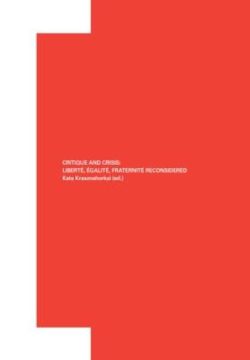The programme series CRITIQUE AND CRISIS ques¬tioned over the span of three years between 2012-2015 the last common denominator of European crisis philosophy, namely, the basis of a democratic order that still holds today. But what is left of liberté, égalité, fraternité? The goal of the series was to see how these basic principles of the shared European iden¬tity measure up to Europe’s current self-image from the per¬spective of artists.
Situations of crisis play a crucial role in the disso¬lution of existing structures and the creation of new ones. This is precisely the point at which CRITIQUE AND CRISIS gets to work as it opened up a space for examining and reflecting on our own preconceived notions and prejudices.
We wanted to reflect on actual positions in the theory of philosophy and art in an es¬say by the Greek economist and philosopher GEORGIOS PAPADOPOULOS on the critical potential of art and on the role of artists in the state of permanent crisis. To widen the horizon of perception we translated and reproduced a fascinating text by the Hungarian philosopher ZSOLT PÁLFALUSI, who has envisioned a new role for philosophy as a performative gen¬re which should provide key competences to deal with crisis situations. The scepticism against the European Idea as such was the topic of a lecture held by the project manager KATA KRASZNAHORKAI at the conference “The European Idea in Art and Art History after 1945”, organized by the German Histori¬cal Museum and the Collegium Hungaricum Berlin in Septem¬ber 2014.
We were asking critical questions in the crisis about the crisis and beyond the crisis.
With works by: Bankleer, Libia Castro/Ólaffur Ólafsson, Jakup Ferri, Ion Grigorescu, Raphaël Grisey, Tibor Horváth, IPUT/Tamas St. Turba, Tamás Komoróczky, Katarzyna Kozyra, Jaroslav Kysa, Imre Lepsényi, István Máriás aka Pista Horror, Olivia Pendler, Dan Perjovschi, Societé Réaliste, Katarina Sevic/Gergely László, subREAL, Ulrich Vogl
- Veröffentlicht am Sonntag 19. Mai 2024 von Revolver Publishing
- ISBN: 9783957632913
- 184 Seiten
- Genre: Hardcover, Kunst, Softcover
